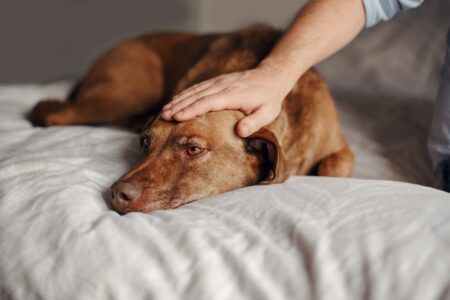
Can Dogs Get Dementia? Causes, Symptoms, and Treatment
Dementia in dogs, also known as canine cognitive dysfunction (CCD), is a condition that affects older dogs and is similar to Alzheimer’s disease in humans. As dogs age, their cognitive functions can decline, leading to changes in behavior and cognitive ability.
While CCD can be a distressing condition for both the dog and the owner, it is important to understand that it is a common condition in older dogs and there are treatment options available.
In this article, we will explore the causes, symptoms, and treatment options for CCD in dogs, and provide some tips for managing the condition.
Can Dogs Get Dementia?
Yes, dogs can develop dementia, also known as canine cognitive dysfunction (CCD). CCD is a progressive and irreversible condition that affects the brain and cognitive functions of older dogs, similar to Alzheimer’s disease in humans.
CCD is most commonly seen in dogs over the age of eight, and is especially common in larger breeds. As dogs age, they may experience changes in their cognitive functions, including memory, learning, and behavior.
What is Dementia?
Dementia is a general term that refers to a decline in cognitive functions, including memory, learning, and behavior. In humans, dementia is most commonly associated with Alzheimer’s disease, but there are many other types of dementia, including vascular dementia, dementia with Lewy bodies, and frontotemporal dementia.
In dogs, dementia is referred to as canine cognitive dysfunction (CCD). Like Alzheimer’s disease in humans, CCD is characterized by a decline in cognitive functions and changes in behavior.
Which Dog Breeds Get Dementia?
Dementia can affect any breed of dog, but some breeds may be more prone to developing CCD than others. Some breeds that may be more prone to CCD include:
- Labrador Retrievers
- German Shepherds
- Poodles
- Beagles
- Dachshunds
What Causes Dementia in Dogs?
The exact cause of dementia in dogs is not fully understood, but there are several potential factors that may contribute to the development of CCD:
- Brain changes: Changes in the brain, such as the loss of neurons and the buildup of protein plaques, can lead to dementia in dogs.
- Genetics: Some breeds of dogs may be genetically predisposed to developing dementia.
- Diet: A diet that is low in antioxidants and essential nutrients may contribute to the development of dementia in dogs.
- Age: Dementia is most common in older dogs, with the risk increasing as the dog ages.
- Toxins: Exposure to environmental toxins, such as lead or mercury, may contribute to the development of dementia in dogs.
- Disease: Diseases such as diabetes, hypothyroidism, and Lyme disease have been linked to the development of dementia in dogs.
- Head trauma: Trauma to the head, such as a blow to the head or a brain injury, may increase the risk of dementia in dogs.
- Lack of mental stimulation: Dogs that are not given enough mental stimulation may be more prone to developing dementia.
Symptoms of Dementia in Dogs
The symptoms of dementia in dogs can vary, but some common signs include:
- Confusion: Dogs with dementia may become confused and disoriented, wandering aimlessly or getting lost in familiar surroundings.
- Sleep changes: Dogs with dementia may experience changes in their sleep patterns, including sleeping more during the day and being more active at night.
- House-soiling: Dogs with dementia may begin to soil the house, even if they were previously house-trained.
- Anxiety and aggression: Dogs with dementia may become anxious or aggressive, particularly in unfamiliar situations or when they are left alone.
- Changes in social behavior: Dogs with dementia may become less social, preferring to stay alone or away from other dogs and people.
- Changes in appetite: Dogs with dementia may experience changes in appetite, including loss of appetite or increased appetite.
- Reduced activity: Dogs with dementia may become less active and may show signs of fatigue, including difficulty getting up or walking.
- Loss of hearing or vision: Some dogs with dementia may experience loss of hearing or vision, which can contribute to confusion and disorientation.
What Are The Three Stages of Dog Dementia?
There are three stages of canine cognitive dysfunction (CCD), or dementia, in dogs:
- Mild: In the mild stage, dogs may exhibit some signs of CCD, such as occasional disorientation and reduced activity.
- Moderate: In the moderate stage, dogs may experience more frequent disorientation, anxiety, and changes in sleep patterns.
- Severe: In the severe stage, dogs may experience significant changes in behavior and cognitive function, including loss of housetraining and decreased recognition of people and places.
First Signs of Dementia in Dogs
The first signs of dementia in dogs may include:
- Wandering aimlessly or getting lost in familiar places
- Standing still and staring for long periods of time
- Confusion and disorientation
- Changes in sleep patterns, such as sleeping more during the day and being more active at night
- Changes in social behavior, including increased aggression or anxiety
- House-soiling, even if the dog was previously house-trained
- Loss of appetite or increased appetite
- Confusion about where to eliminate, even when outdoors
- Forgetting or ignoring familiar commands
- Reduced activity, including difficulty getting up or walking
- Increased irritability or sensitivity to noise
- Changes in coat quality, including increased shedding or mats
- Loss of hearing or vision
What Are The Final Stages of Dementia in Dogs?
In the final stages of canine cognitive dysfunction (CCD), or dementia, in dogs, the following symptoms may occur:
- Complete loss of housetraining and elimination control
- Loss of recognition of people and places, including their owners and familiar surroundings
- Decreased activity and lethargy, with difficulty getting up or walking
- Loss of appetite and weight loss
- Changes in coat quality, including excessive shedding and mats
- Increased confusion and disorientation, including wandering aimlessly and getting lost in familiar places
- Increased anxiety and aggression, including growling, snapping, or biting
- Changes in sleep patterns, with increased sleeping during the day and increased activity at night
- Complete loss of hearing or vision
- Decreased responsiveness to stimuli, including sounds, smells, and touch
- Behavioral regression, with a return to puppy-like behavior, such as chewing or digging
Dog Dementia Treatment
There is no cure for canine cognitive dysfunction (CCD), or dementia, in dogs, but there are treatment options that can help slow the progression of the disease and improve the quality of life for affected dogs.
Medication: Your veterinarian may prescribe medications to help manage the symptoms of CCD. These medications may include cholinesterase inhibitors, such as selegiline and galantamine, which can help improve cognitive function in dogs with CCD.
Supplements: Some supplements, such as antioxidants and omega-3 fatty acids, may help to improve cognitive function in dogs with CCD.
What Medication is Used for Dog Dementia?
There are several medications that may be prescribed by your veterinarian to help manage the symptoms of canine cognitive dysfunction (CCD), or dementia, in dogs. These medications include:
- Cholinesterase inhibitors: These medications, such as selegiline and galantamine, can help improve cognitive function in dogs with CCD.
- Neuroprotective agents: These medications, such as melatonin, can help protect the brain from damage caused by CCD.
- Antidepressants: These medications, such as fluoxetine and amitriptyline, can help reduce anxiety and aggression in dogs with CCD.
- Anti-anxiety medications: These medications, such as diazepam and buspirone, can help reduce anxiety and restlessness in dogs with CCD.
- Anti-inflammatory medications: These medications, such as corticosteroids and non-steroidal anti-inflammatory drugs (NSAIDs), can help reduce inflammation in the brain and improve cognitive function in dogs with CCD.
How Can I Treat My Dog Dementia at Home?
While medications can help manage the symptoms of canine cognitive dysfunction (CCD), or dementia, in dogs, there are also several things you can do at home to help improve your dog’s quality of life.
- Exercise: Regular exercise can help improve cognitive function and reduce anxiety in dogs with CCD. Try to take your dog for at least one or two short walks per day, or engage in other physical activities that your dog enjoys.
- Mental stimulation: Mental stimulation can help improve cognitive function in dogs with CCD.
- Social interaction: Social interaction can help reduce anxiety and improve cognitive function in dogs with CCD. Try to spend as much time as possible with your dog, playing games, going for walks, or just spending time together.
- Structure and routine: A consistent schedule and routine can help reduce confusion and anxiety in dogs with CCD. Try to feed your dog at the same time every day, take them for walks at the same time every day, and provide them with a consistent bedtime routine.
How to Calm A Dog With Dementia At Night
Dogs with canine cognitive dysfunction (CCD), or dementia, may experience changes in their sleep patterns, including increased activity at night. Here are some tips for calming a dog with dementia at night:
- Establish a bedtime routine: Establish a consistent bedtime routine for your dog, including feeding them at the same time every night, going for a short walk, and providing them with a cozy place to sleep.
- Limit activity before bedtime: Limit activity in the hours before bedtime to help your dog wind down and prepare for sleep.
- Avoid exposing your dog to blue light: Blue light from screens and other sources can interfere with your dog’s sleep patterns. Avoid exposing your dog to blue light in the hours before bedtime.
- Consider using a white noise machine: A white noise machine can help mask other noises that may be disturbing your dog’s sleep.
- Consider using calming aids: There are several calming aids, such as calming collars and diffusers, that can help reduce anxiety and promote relaxation in dogs with CCD.
Who Should I Talk to About This Disease If I Think My Dog May Have Dementia?
If you think your dog may be experiencing symptoms of canine cognitive dysfunction (CCD), or dementia, it is important to talk to your veterinarian. Your veterinarian can perform a physical exam, run diagnostic tests, and provide you with an accurate diagnosis and treatment plan for your dog.
In addition, your veterinarian can provide you with support and resources for managing your dog’s symptoms, and may refer you to a veterinary behaviorist or other specialist for additional help.
Dog Dementia When to Put Down
Deciding when to euthanize a dog with canine cognitive dysfunction (CCD), or dementia, can be a difficult and emotional decision. Here are some factors to consider when making this decision:
- Quality of life: If your dog is no longer able to enjoy the activities they once enjoyed, such as playing, going for walks, or interacting with family members, this may indicate that their quality of life has declined.
- Pain and discomfort: If your dog is experiencing chronic pain or discomfort that cannot be managed with medication or other treatments, euthanasia may be the kindest option.
- Cognitive decline: If your dog’s cognitive decline is causing them to become confused, disoriented, or aggressive, this may impact their quality of life and the safety of others.
- Inability to perform basic functions: If your dog is unable to eat, drink, or eliminate on their own, this may indicate that their quality of life has declined significantly.
- Changes in behavior: If your dog’s behavior changes significantly, such as becoming withdrawn, aggressive, or fearful, this may indicate that their quality of life has declined.
FAQs:
Q. At what age do dogs get dementia?
Dogs can develop canine cognitive dysfunction (CCD), or dementia, at any age, but the condition is most common in dogs over the age of eight.
Q. How long can dogs live with dementia?
The lifespan of dogs with canine cognitive dysfunction (CCD), or dementia, can vary, but most dogs live for one to two years after diagnosis.
Q. Do dogs with dementia bark a lot?
Dogs with canine cognitive dysfunction (CCD), or dementia, may bark more frequently due to confusion and anxiety.
Q. Can dog dementia be treated?
There is no cure for canine cognitive dysfunction (CCD), or dementia, in dogs, but there are treatment options that can help slow the progression of the disease and improve quality of life.


